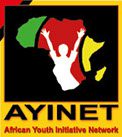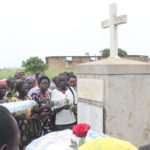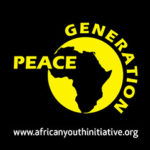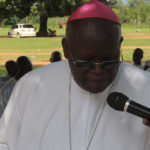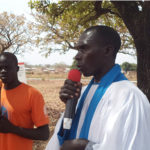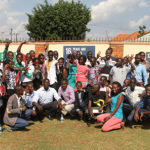Transitional Justice
AYINET Pays Respect to Victims of Atiak Massacre 20 April 2015
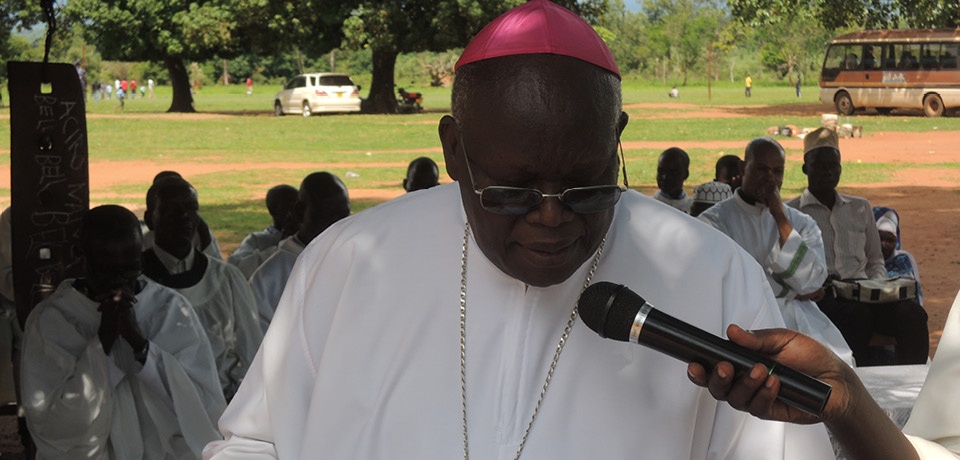
The African Youth Initiative Network (AYINET), in its continuous identification, support for and cooperation with victims of war, financially supported and attended the Atiak Massacre memorial service that took place on 20 April 2015 at the Olya Primary School, Amuru District. The memorial service is an annual gathering to commemorate the massacre perpetrated by the Lord’s Resistance Army (LRA) against innocent civilians from Atiak on 20 April 2004.
This memorial service was attended by various CSOs (e.g. JRP, ACORD), other institutions (e.g. Gulu University, Atiak Technical School Survivors’ Association, Atiak Massacre Survivors’ Association), political representatives (e.g. LC I to LC V, District Commissioner, resident Member of Parliament), religious leaders (Archbishop John Baptist Odama and Sheikh Musa Khal) and the Atiak community at large. In total, close to 1,000 people from within the community and neighbouring districts were present.
The Memorial Prayer
The service was co-led by Archbishop John Baptist Odama and Sheikh Musa Khalil. The religious leaders read passages from the Bible and the Quran that urge those who are in conflict to reconcile with their fellow brothers and sisters and appeal to leaders not to oppress their subjects. They prayed for peace and reconciliation, for those who perished in and those who survived the Atiak Massacre and their family members, for good leaders, Uganda and East Africa.
In Their Own Words
“I appreciate everyone for taking part in this year’s memorial service organised in honour of those who lost their lives in the Atiak Massacre. On behalf of the Organising Committee, I would especially like to appreciate the support received by AYINET and ACORD,” said Mr. William Odong, Chairman of the Organising Committee.
“On 20 April 2004 at 11:00 PM, we heard gun shots coming from the South. People got scared and ran without direction. This allowed the LRA to abduct many of them. The LRA gathered abducted people at sub-county premises together with some looted property; then they started setting huts on fire. At some point an airplane appeared and began launching bombs. The surprise allowed some people to escape, but many remained out of fear. Initially the LRA told us that we’d be taken to Southern Sudan to be trained as rebels, but later on they changed their mind. They separated boys from old men and women, pregnant women and breastfeeding mothers from girls. To revenge the attack by the Government’s airplane, one of them said that they would prove to the Government that their weapons were still working. Eighteen of us who were abducted were made to carry LRA’s things to a destination point. Once there, I escaped, the other seventeen were killed,” remembered Mr. Jacob Nokorach, Chairperson of the Atiak Massacre Survivors’ Association
“The Atiak Technical School Survivors’ Association was started in order to enable the survivors to continue their vocational studies amidst financial challenge. According to the records of the Massacre, forty-eight (48) students and two teachers were killed, but if we count all casualties, over fifty-two (52) people were killed that day. As an association, we have been going to primary and secondary schools to provide scholastic materials like pens and books. I appreciate the Government, represented by the office of the RDC, for the vocational instruments that we were supplied with. We are also improving the livelihood of the families of the survivors by providing seeds like maize and beans,” explained Mr. Wilberforce Olanya, representative of the Atiak Technical School Survivors’ Association.
“I like the passages quoted during the [religious] service that say that those who are killed as innocents are saints. As Acholi people, we know that the spirit does not die and we believe that the people who were killed are with us,” shared Mr. Ocan John Bosco, LC III Chairperson Atiak.
“Because of the war, our people suffered a lot. Our children, grand children and their children should know about their history and learn from it. This can only be done by writing a book on the Atiak Massacre, a book that will preserve the memory for the generations to come,” pleaded a representative of the Atiak Lawani Development Association.
In Our Own Words
“I would like to thank the organisers of this annual event and the religious and cultural leaders for their tireless contribution to peace in our region and the country at large. My appreciation also goes out to civil society organisations, our partners in development and sustainable peace, working to assist communities after the breakdown caused by war. This kind of memorial service is very important because the maintenance of memory contributes to healing.
As AYINET, we have identified ourselves to be in the service of Ugandan victims and we pledge to continue to support them. This is not our first time and it will not be our last time to reach out to Atiak; in the past, members of this community have been beneficiaries of our medical and psychosocial rehabilitation programme and were involved in conferences which aim to amplify victims’ voices in Uganda’s Transitional Justice processes.
AYINET’s medical rehabilitation and Transitional Justice programmes are some of the reasons for which the organisation received a nomination for the Nobel Peace Prize. We pray and ask you to pray along that we will be awarded the Prize as this would not only recognise our work but draw much needed global attention to the plight of victims in Uganda and across the world.
I have travelled all over Uganda and I’ve realised that we have all been affected by war. There are enough mass graves in this country and it is time for us to work for unity, peace and reconciliation of Ugandans. We should forgive if we can while the International Criminal Court proceeds with trials against LRA commanders. May peace prevail in Acholi land, in Northern Uganda and our motherland Uganda,” prayed Mr. Denis Odwar, AYINET National Transitional Justice Coordinator.
Read the statement delivered on behalf of the Acholi Religious Leaders Peace Initiative here
